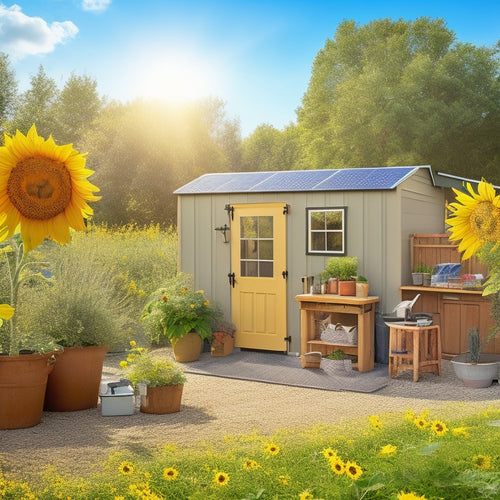
Home Battery Backup System
Share
You can count on a home battery backup system to provide reliable power during outages, ensuring your critical appliances and electronics keep running smoothly. This means you'll have peace of mind knowing your refrigerator will stay cool, lights will stay on, and your daily routine won't be disrupted. By storing excess energy from renewable sources, these systems allow you to control your energy bills and prioritize essential devices. With customizable power allocation and seamless backup power, you'll be well-prepared for grid failures. As you investigate the benefits of home battery backup systems, you'll uncover how they can optimize your energy storage and usage.
The Essentials
- Home battery backup systems provide reliable power during outages, ensuring critical appliances and electronics continue to function.
- These systems store excess energy from renewable sources for later use, contributing to energy independence and grid failure protection.
- Customizable power allocation prioritizes essential devices, enhancing energy control and emergency preparedness during power interruptions.
- Deep cycle battery technology and proper maintenance practices are crucial for extending battery lifespan and overall system performance.
- Accurate calculation of daily energy consumption is essential for proper battery sizing to meet power needs during outages.
Reliable Power During Outages
When the grid fails, you need a reliable source of power to keep your home running smoothly. That's where a home battery backup system comes in, providing power on demand to your critical appliances and electronics.
By ensuring that critical home systems, such as refrigeration and lighting, continue to function smoothly Automatic Transfer Switch, you can prevent food spoilage and maintain safety.
With grid failure protection, you can rest assured that your home will remain powered during outages, giving you peace of mind and convenience.
Power On Demand
Your home becomes an island during power outages, cut off from the grid. But with a home battery backup system, you can enjoy reliable power on demand. This means you can continue to power your essential appliances and devices, even when the grid is down.
| Feature | Benefits | Advantages |
|---|---|---|
| Energy Efficiency | Reduces energy waste | Saves you money on energy bills |
| Renewable Sources | Utilizes clean energy | Reduces carbon footprint |
| Automatic Switching | Instantly switches to backup power | Guarantees continuous power supply |
| Customizable Power | Allocates power to priority appliances | Gives you control over your energy usage |
With power on demand, you're no longer at the mercy of the grid. You can enjoy the freedom to live life uninterrupted, even during outages. Whether you need to keep your fridge running, your lights on, or your medical equipment functioning, a home battery backup system gives you the power to do so. By incorporating energy-efficient and renewable sources, you can reduce your reliance on the grid and enjoy a more sustainable lifestyle.
Grid Failure Protection
You rely on the grid to power your daily life, but its unreliability can leave you in the dark. When the grid fails, you're left without power, and your daily routine comes to a grinding halt.
With a battery storage system, you can store excess energy generated by your solar panels during the day to use at night or during power outages Energy Storage for Solar. This means you'll have more control over your energy bills, as you can store energy and use it during peak hours, rather than relying on the grid and incurring high costs.
A home battery backup system provides grid failure protection, guaranteeing you have reliable power during outages. This system is designed to detect grid outages and seamlessly switch to backup power, providing you with uninterrupted electricity.
Incorporating a home battery backup system into your emergency preparedness plan guarantees you're always ready for unexpected power outages. By combining renewable energy sources, such as solar or wind power, with a battery backup system, you can reduce your reliance on the grid and enjoy a more sustainable lifestyle.
With a home battery backup system, you'll have peace of mind knowing you're protected from grid failures, and you'll be able to keep your essential appliances running, even when the grid is down. This means you can stay connected, keep your food fresh, and maintain your independence, no matter what the grid throws your way.
Saves Food From Spoilage
When the grid goes down, you're protected from food spoilage with a home battery backup system, which is especially essential for households relying on off-grid battery backup systems.
This system provides power outage protection, ensuring your refrigerator and freezer keep running, so you don't lose your perishable food items.
Power Outage Protection
One of the most vital advantages of a home battery backup system is its ability to provide power outage protection, saving food from spoilage. When the grid goes down, your backup system kicks in, guaranteeing your refrigerator and freezer stay powered. This is especially essential for households with family members who rely on refrigerated medication or have specific dietary needs.
| Outage Duration | Food Safety Risk | Backup System Benefit |
|---|---|---|
| 2-4 hours | Low | Maintains refrigerator temperature, preventing spoilage |
| 4-6 hours | Moderate | Keeps freezer temperatures stable, preserving frozen food |
| 6-12 hours | High | Guarantees continuous power, safeguarding your entire food supply |
| 12+ hours | Extreme | Provides uninterrupted power, giving you peace of mind |
| Unknown | Unpredictable | Offers reliable backup, no matter the duration |
Fresh Food Preservation
The delicate balance of your refrigerator's temperature is essential for preserving fresh food, and a home battery backup system guarantees that this balance is maintained during power outages. Without a reliable backup system, your refrigerator's temperature can fluctuate, leading to spoilage and foodborne illnesses.
With a home battery backup system, you can verify that your food storage remains at a safe temperature, preventing spoilage and maintaining food safety.
A home battery backup system also enables you to employ energy-efficient preservation methods, such as temperature control and storage techniques that maximize nutritional retention. By maintaining a consistent refrigerator temperature, you can prevent the growth of bacteria and other microorganisms that can cause foodborne illnesses.
Furthermore, a home battery backup system allows you to store perishable items for longer periods, reducing food waste and saving you money. By investing in a home battery backup system, you're not only verifying your food safety but also promoting energy efficiency and reducing your environmental footprint.
Deep Cycle Battery Technology
You're likely aware that the life expectancy of your deep cycle batteries greatly influences your home battery backup system's overall performance.
The number of charge cycles your batteries can handle is critical, and it's crucial to understand that cycle depth matters.
When selecting deep cycle batteries, you'll want to take into account both the battery life expectancy and the depth of discharge to guarantee your system meets your power needs.
In particular, high-performance batteries like lithium ion batteries can provide a more efficient and reliable energy storage solution, allowing you to maximize your renewable energy storage and reduce your reliance on the grid.
Battery Life Expectancy
Frequently, homeowners considering home battery backup systems wonder how long their deep cycle batteries will last. You're likely curious about the factors that affect battery life expectancy, so you can guarantee you get the most out of your investment.
Battery life expectancy is heavily influenced by proper battery maintenance and charging techniques. For instance, keeping your batteries at room temperature (between 65°F and 75°F) can greatly extend their lifespan.
Additionally, avoiding deep discharges and maintaining a consistent charge cycle will help prolong battery life.
You should also be mindful of the depth of discharge (DOD) when charging your batteries. Aiming for a moderate DOD of around 50% can help extend battery life.
In addition, using a high-quality charger that's designed for deep cycle batteries will also contribute to a longer lifespan.
Cycle Depth Matters
By delving into the world of deep cycle battery technology, it becomes clear that cycle depth plays a critical role in determining the overall performance and lifespan of your home battery backup system.
As you investigate the complexities of deep cycle batteries, you'll uncover that cycle depth refers to the percentage of the battery's capacity that's used during each charging cycle. For instance, if you use 50% of your battery's capacity before recharging, that's considered a 50% cycle depth.
A higher cycle depth doesn't necessarily translate to better battery efficiency. In fact, deeper cycle depths can lead to reduced battery life and overall system performance. This is because deeper discharges cause more wear and tear on the battery's cells, leading to a shorter lifespan.
Shallower cycle depths, on the other hand, can help prolong battery life and maintain peak performance. By understanding the importance of cycle depth, you can enhance your charging cycles to maximize battery efficiency and extend the lifespan of your home battery backup system.
Count Your Daily Wattage
You need to calculate your daily energy consumption to determine the required capacity of your home battery backup system.
This involves tallying up the wattage of all the appliances and devices you want to power during an outage, as well as their expected runtime.
When considering your energy storage needs, it's crucial to think about your renewable energy storage goals and how a home battery system can help you achieve them.
Daily Energy Consumption
Accurately gauging your daily energy consumption is critical to determining the suitable size of your home battery backup system. Understanding your energy usage patterns helps you identify the appliances and devices that consume the most power, ensuring you have a reliable backup during outages.
To get a clear representation of your daily energy consumption, take note of your usage patterns over a week or a month. Record the appliances and devices you use, their wattage, and the duration of use. This will give you a thorough summary of your energy needs.
| Appliance/Device | Wattage | Duration of Use (hrs) |
|---|---|---|
| Refrigerator | 150 | 24 |
| TV | 100 | 4 |
| Laptop | 65 | 8 |
| Lights (5) | 25 | 12 |
Wattage Calculation Tips
Every appliance and device in your home consumes a certain amount of power, measured in watts. To determine your daily wattage, you'll need to calculate the total power consumption of all the devices you want to back up during an outage.
Start by identifying the essential appliances and devices you can't live without, such as refrigerators, lights, and computers. Then, check the nameplate or manufacturer's specifications to find the wattage rating for each device. For devices with variable power consumption, such as TVs or computers, use the maximum power rating to guarantee you have enough backup power.
When calculating your daily wattage, consider the duration of each device's usage. For instance, if you use a 100W light bulb for 8 hours a day, its daily wattage would be 800Wh (100W x 8h).
Add up the daily wattage of all your essential devices to determine your total daily energy consumption. This information is significant for battery sizing, as it verifies you have a sufficient backup power supply to meet your energy needs during an outage.
Longer Cycle Life Guaranteed
You need a home battery backup system that can withstand the test of time, and that's where a longer cycle life comes in.
A longer cycle life guarantees your battery will last for thousands of charge and discharge cycles, saving you money on replacement costs.
Extending Battery Lifespan
The lifespan of your home battery backup system's batteries greatly impacts the overall system's effectiveness and cost. A longer-lasting battery means you'll have a reliable source of power when you need it most. To extend the lifespan of your batteries, you'll want to follow proper battery maintenance tips and ideal charging practices.
You should avoid extreme temperatures, as they can reduce your battery's lifespan. Keep your batteries away from heat sources and guarantee good airflow around them.
It's also essential to monitor your battery's state of charge, as overcharging or undercharging can cause damage. Additionally, you should perform regular checks on your batteries' electrolyte levels and specific gravity. This will help you identify any potential issues early on.
Frequently Asked Questions
How Does the Battery Backup System Connect to My Home's Electrical Panel?
You connect your backup system to your home's electrical panel through a specialized inverter/charger, which integrates with your existing wiring configurations, enabling load management and ensuring a seamless shift between grid and backup power.
Can I Install a Home Battery Backup System Myself?
You can attempt a DIY installation, but be aware that it's essential to prioritize safety considerations, such as proper wiring and electrical connections, to avoid risks and guarantee a successful integration with your home's electrical panel.
Are Home Battery Backup Systems Compatible With Solar Panels?
You'll be interested to know that 80% of homes with solar panels also install energy storage systems. When it comes to solar compatibility, you'll find that most home battery backup systems seamlessly integrate with solar panels, maximizing your energy independence and storage capabilities.
How Often Should I Maintain My Home Battery Backup System?
To guarantee peak performance, you should maintain your system regularly, checking for software updates, inspecting connections, and monitoring performance every 3-6 months, with more thorough checks annually, to prevent issues and maximize energy independence.
Are There Any Government Incentives for Installing a Home Battery Backup System?
When you're pioneering a sustainable lifestyle, Uncle Sam's got your back - literally! You can utilize federal rebates and local programs for installing eco-friendly systems, like home battery backup systems, which can shave off up to 30% of the cost.
Final Thoughts
As you weather the storm, your home battery backup system stands tall, a lighthouse of reliability in the dark. Like Atlas holding up the sky, it keeps your lights on, your fridge humming, and your family safe. With its deep cycle battery technology, it's a guardian against the unpredictable, a sentinel that counts your daily wattage and keeps your power flowing. And when the grid fails, it's your rock, your shelter from the storm, guaranteeing a longer cycle life that's as solid as the earth beneath your feet.
Related Posts
-

Building an Emergency Backup Solar Power System in 5 Essential Steps
Building an emergency backup solar power system involves five key steps. First, assess your daily energy needs to ide...
-

Solar Powered Lights for Sustainable Home Decor
Solar-powered lights offer a stylish and eco-friendly way to enhance your home decor. They capture sunlight, converti...
-

Essential Hiking Lights for Safety and Fun
When you're hitting the trails, essential hiking lights are vital for safety and fun. A lightweight headlamp offers h...


